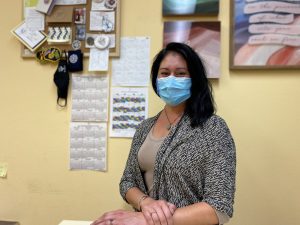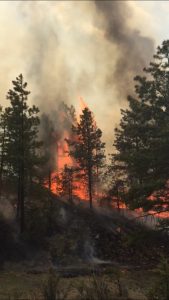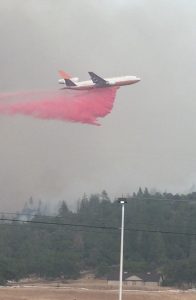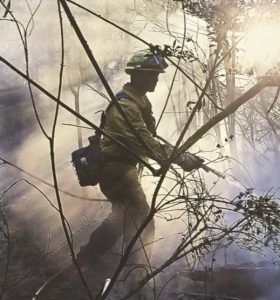Dr. Michelle Kent was still a resident in medical school when she met a patient who would change the course of her life, a firefighter who was preparing to retire. He made a strange request: could she help him gather information for when he developed cancer? Although he was healthy at the time, in his mind it wasn’t a matter of if, but when, he would have the disease. “I had no idea what he was talking about,” she recalls. “He said, ‘Let me provide you with information about the health risks for firefighters and first responders.’”

He did, and what Kent discovered was eye-opening. Cancer is a leading cause of death among firefighters. Many other medical conditions such as heart and respiratory disease, certain infectious diseases and post-traumatic stress disorder (PTSD) are considered occupationally-related conditions for the profession. Running head first into a burning building may be the most obvious danger experienced by firefighters, but long term and repeated exposure to burning materials and chemicals coupled with stress, trauma and demanding working conditions is what really takes a toll on firefighters.
The information was game-changing for Kent, who has since developed a career focused on caring for those who are on the front lines. For the past two years, Kent has been a primary care naturopathic physician at Olympia’s Heart of Wellness. Of her over 300 patients, between 60% and 80% are first responders and members of their families. She cares for nearly 80% of the Central Piece Fire & Rescue team, including their administrators. To better understand the stressors and trauma they cope with, she rides along with firefighters and EMTs on their shifts.

“These individuals are doing 24 to 72-hour rotations,” she points out. “They entered this profession because they wanted to help, but they’re dealing with repetitive traumas as the nature of their jobs, and then they’re expected to head right back to the station and keep going. How much time do they have to process that trauma?”
The way each first responder copes is individual, she notes. As trauma and stress builds, some resort to alcohol abuse, heavy tobacco or cannabis use and others distract themselves by staying busy or taking on side jobs, exhausting themselves in the process. “Their families are largely impacted as well,” says Kent. “When someone comes home from a 72-hourshift, they’re often looking to disengage, and they don’t want to be asked any questions and often wish to be left alone. That’s not ideal for family living, so we look at ways to decompress and develop healthy coping mechanisms and habits.”
Kent keeps a modified Detroit schedule (a scheduling template for fire departments) on her back wall and consults it before appointments to understand the state of her patient. “When every firefighter comes through, I ask them what station they’re from and what shift they’re on,” she says. “That tells me if they’re feeling like a zombie because they just came off a 48-hour shift or if they have a bit of energy because they’re on a break.”
The first responder community tends to be close-knit and protective of each other, with an understanding built on shared experience. In the field, they need to make rapid assessments and communicate effectively, a model Kent replicates. “I’m blunt with them,” she says. “I tell them,‘This is what you need to look at and this is what you need to do.’ Then I give them tools.”

Whereas some physicians might start with pharmaceuticals to address PTSD and other issues, Kent and her colleagues at Heart of Wellness take a holistic approach that includes mindfulness and self-awareness. It includes breathing techniques to slow heart rate and lower blood pressure, even in the most stressful circumstances. Kent also offers methods to self-monitor whether first responders’ basic needs are being met. “How are you engaging in the world around you?” she asks. “Have you eaten, have you had anything to drink, have you slept? We put it together and dial it all in.”
The results have been so positive that some first responders prefer to work with Dr. Kent exclusively. Often, one firefighter will share his or her experience with the rest of the firehouse and soon they’re all scheduling appointments, including some from as far away as Snohomish County.
Kent connects them with her colleagues at Heart of Wellness who provide physical therapy, massage therapy, nutritional and herbal remedies. “We sit with these patients, and we listen to them,” she explains. “We need to find out who they are as individuals and then we open our toolbox and go the route that they need. What we can do here is profound.”
Although the majority of Kent’s patients are first responders, she treats other patients as well.

Rather than narrowing her focus, the work with firefighters and EMTs has expanded her ability to serve everyone. “It doesn’t skew me in a direction of not being able to help the general public,” she says. “It actually opens up the gates. Working with the first responder community has made me much more empathetic and ready to deal with any situation. They keep me on my toes.”
Since that first patient opened her eyes to the medical repercussions of frontline work, Kent hasn’t stopped thinking about ways to better care for the caretakers. “For the general public, we know what it means to receive essential services from first responders,” she says, “but what does it mean for the community that provides these services to us? They do it willingly, with heart, integrity and empathy and it comes with the risk of their health. These are heroes without capes, and Heart of Wellness is here to help them.”
Find out more by visiting the Heart of Wellness website or calling 360.570.0401.
Sponsored















































